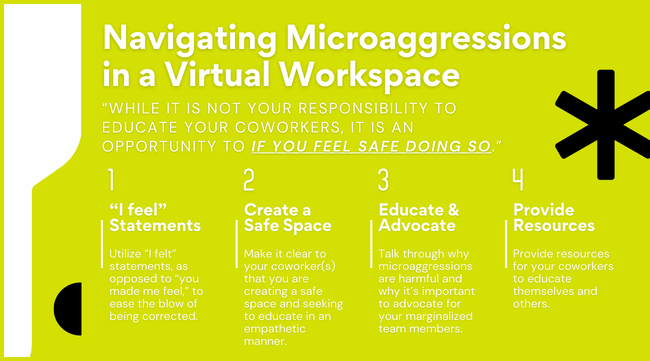
A microaggression is a conscious or unconscious verbal or non-verbal comment or action based on biases towards marginalized groups. Marginalized groups can include BIPOC (Black, Indigenous, and People of Color), people with disabilities, women, the LGBTQ+ community, and more. Examples of microaggressions can consist of being talked over in meetings, having your hair touched, having your appearance commented on, and one of a thousand different nuanced actions directed your way.
According to an article from Culture Amp, “We may call microaggressions ‘micro’ aggressions, but their cumulative impact can be measured on a ‘macro’ scale. Day-by-day, slight-by-slight, microaggressions can feel like ‘death by a thousand papercuts.’” These aggressions, however seemingly small, have a deeply profound physical and mental impact on the individuals experiencing them.
It’s no wonder that with the effect that microaggressions can have on people, these groups most affected are reluctant to return to offices regularly. “That’s probably part of why only 3% of Black employees reported wanting to return to the office full-time, compared to 21% of White workers” (Culture Amp). While the amount of microaggressions is drastically reduced while working remotely, there are new ways that microaggressions can manifest in a virtual work environment. For instance, questioning your home office or if you’ll be able to focus with your kids in the background. It’s been shown that when people work from home, they feel more comfortable making remarks without regard for the influence this will have on their coworkers.
Being on the receiving end of microaggressions, your first instinct can be to react negatively right then and there. And while it is not your responsibility to educate your coworkers, it is an opportunity to if you feel safe doing so. Chances are, this person’s goals are not to intentionally hurt you, but either way, it would be beneficial to nip the comments in the bud. This correction can happen in the moment or later when you can approach the situation with a clearer head.
- Utilize “I felt” statements, as opposed to “you made me feel,” to ease the blow of being corrected.
- Make it clear to your coworker(s) that you are creating a safe space and seeking to educate in an empathetic manner.
- Talk through why microaggressions are harmful and why it’s important to advocate for your marginalized team members.
- Provide resources for your coworkers to educate themselves and others.

Handling microaggressions in a remote working environment can be nuanced and difficult to navigate. Whether you’re on the receiving end or the giving end, it’s important to be open; open to compassionately giving correction, but also open to sympathetically receiving correction. These conversations are hard to have and can be awkward, but having them is crucial in building an equitable work environment, regardless of being in the office or working remotely. When we take the time to understand others and work together to implement systems that benefit all of us, everyone wins.
Want more information that will help you to succeed in your career? Subscribe to The JOHNLEONARD blog below and receive the latest career advice!
